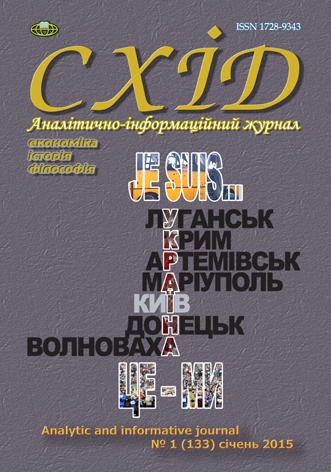Socioeconomic features of modernization of social relations on the principles of social responsibility
DOI:
https://doi.org/10.21847/1728-9343.2015.1(133).40056Keywords:
socioeconomics, social responsibility, modernization, public attitudes, values, spirituality, trust, people, business, governmentAbstract
The features of the formation of social responsibility on the basis socio-economics. Assess the degree of elaboration of this issue. Determine the need of modernization of public administration based on the results of the expert survey of scientists and educators. Justification of obstacles on the way to becoming a social responsibility of man, society, government, business. Public relations need to be modernized on formation of social responsibility of man, society and state. According to the expert survey scientists and educators on issues of social responsibility 85.4% of experts believe the irresponsibility of the prevailing system of social relations, and 79.8% were of the opinion lack of prestige Ukrainian society to be socially responsible person. Are defined motives initiate and stimulate the formation and development of social responsibility in the system of social relations based on socioeconomics.
On the first place among the priority levers of influence on the formation of social responsibility 62% of the experts have put the system of spiritual and moral education, family education. Generalization of obstacles becoming social responsibility of the state, society, business and the person identified low level of spiritual and moral culture of the ruling elite. Among the components of social responsibility, it was 63.3%, Ukrainian society - 51.3%, man - 52.5% of business - 30.4%. Motivation for the development of social responsibility in Ukraine are: the inevitability of punishment for violation of legal and moral norms, regardless of status (52.5%), revaluation of values aimed at improving the internal culture, human rights, agreements, requirements (47.5%) consolidation of business, government, science of socially significant problems (43.7%). Social responsibility socioeconomics context requires the development of values such as honor, dignity, commitment, reliability, prevention of risks and hazards, increased spiritual and moral level of trust and the development of social partnership.Downloads
References
Zaloznova Yu. S. (2014), Socio-economic development of Ukraine in the context of global and national challenges, Institute of Industrial Economics, Kyiv, 336 p. (ukr).
Rykhter K. K., Pakhomova N. V. (2009), Bulletin of St. Petersburg State University, Series 5, Economy, Vol. 5, pр. 12-20 (rus).
Kanayeva O. A. (2010), Bulletin of St. Petersburg State University, Series 5, Economy, Vol. 5, pр. 25-33 (rus).
Deych M. Ye. Areas of corporate social responsibility in the context of socio-economic approach, available at: http://dspace.nbuv.gov.ua/bitstream/handle/ 123456789/39829/14Deich.pdf?sequence=1.
Novikova O., Deych M., Pankova O. (2013), Diagnosis state and prospects of social responsibility in Ukraine (expert evaluation), NAN Ukrainy, Institute of Industrial Economics, Donetsk, 296 p. (ukr).
Deych M. Ye. (2014), The formation and development of multilevel system of social responsibility: administrative aspect, NAN Ukrainy, Institute of Industrial Economics, Donetsk, 352 p. (ukr).
Kolot A.M. [editor] (2012), Sustainability: Theory and Practice Development, KNEU, Kyiv, 501 p. (ukr).
Etzioni A. (2002), Socioeconomics: the next steps, available at: http://www.ecsoc.msses.ru/pdf/ecsoc_t3_nl.pdf.
Alesina A., Angeletos G.-M. (2005), Fairness and Redistribution, American Economic Review, Vol. 95, № 4, рр. 960-980 (engl).
Downloads
Published
How to Cite
Issue
Section
License
Copyright (c) 2015 Yuliia Zaloznova

This work is licensed under a Creative Commons Attribution-NonCommercial-NoDerivatives 4.0 International License.
1. Authors bear responsibility for the accuracy of facts, quotations, numbers and names used.
2. Manuscripts are not sent back.
3. The publisher does not always agree with the authors' opinion.
4. The authors reserve the right to authorship of the work and pass the first publication right of this work to the journal under the terms of a Creative Commons Attribution-NonCommercial-NoDerivatives 4.0 International License. This license allows others to distribute (copy) the published work for non-commercial purposes, provided there is mandatory attribution to its authors and a link to the first publication in our journal.
5. The authors have the right to conclude separate supplement agreements that relate to non-exclusive work distribution in the form in which it has been published by the journal (for example, to upload the work to the online storage of the journal or publish it as part of a monograph), provided that the reference to the first publication of the work in this journal is included.

